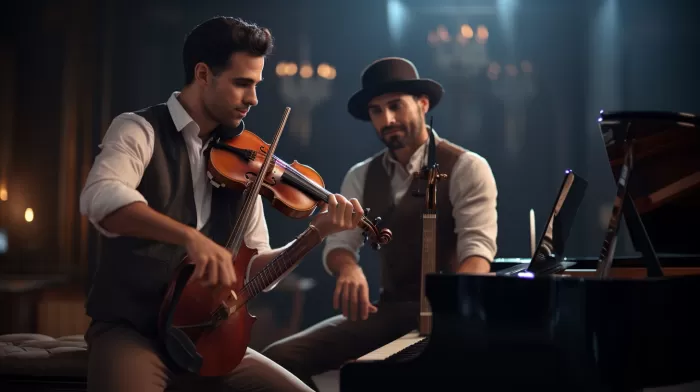Imagine syncing your brain waves with someone else’s just by playing music or participating in a team sport together. It sounds like a scene from a sci-fi movie, but recent research says it’s possible.
A study conducted at the Max Planck Institute for Human Development in Berlin discovered that people who play music together experience synchronized brain waves. This level of synchronicity goes beyond superficial similarities in external stimulation and dives into a deeper level of interpersonal coordination. It’s not just limited to music, though – researchers believe athletes engaged in team sports may also experience brain wave coordination.
The Power of Coordinated Action
During the study, researchers noticed that when people coordinated their actions, small networks were formed between different brain regions. While this observation took place within individuals, they also found that these similar network properties extended to the brains of the individual players, mainly when mutual coordination was of utmost importance. This was most evident when the players were about to start playing a piece of music together.
Johanna Sänger, a researcher involved in the study, noted that the difference between the leader and the follower influences this brain wave synchronization. When measuring the electrical activity captured by the electrodes, the leading player showcased a more robust form of internal synchronization, even before the duet began playing. This suggests that the synchronization could be due to the leader’s decision to start playing at a specific moment.
Social Cognition and Music Production
The data collected so far indicate that synchronization between individuals occurs in brain regions associated with social cognition and music production. This exciting revelation offers potential advancements in understanding the intricacies of human social interaction and collaboration.
In addition to music, researchers believe that different people’s brain waves may also synchronize during other activities that require mutual coordination, such as sports or communication. Team sports, for example, require a high level of coordination and cooperation among players for the team to function optimally.
For musicians and athletes alike, this idea of brain synchronicity might be a game-changer in enhancing collaboration and fluidity in their respective fields. Likewise, the same understanding could have practical applications when it’s applied to various other aspects of society that require group work and cooperation.
The Benefits of Brain Synchronicity
Brain wave synchronization during coordinated activities could have several benefits, such as:
- Improved communication – Synchronization could lead to better interpersonal understanding and communication in various situations, from team sports to everyday conversations. People might understand others’ perspectives more easily if their brain waves are in sync. Improved communication could lead to better teamwork and more constructive discussions.
-
Enhanced empathy – When brain waves synchronize during activities like playing music or engaging in team sports, participants might feel more connected to the people they’re interacting with. This heightened sense of connection could promote empathy and understanding, leading to a more harmonious environment.
-
Increased creativity – Synchronized brain waves could foster an environment conducive to creative thinking and problem-solving. When people are in sync with each other, they’re more likely to feel comfortable sharing ideas and collaborating on innovative projects.
Tapping into the power of brain synchronicity has the potential to enhance various aspects of our lives, from increasing empathy and communication to boosting creative thinking. As more research is conducted, it’ll be fascinating to see how brain wave coordination affects other areas, like education, rehabilitation, and even personal development.
By gaining a greater understanding of synchronized brain waves during coordinated activities, we may be able to unlock new potential in areas such as music, sports, and beyond. The possibilities are as vast as our imaginations allow. So next time you play music with a friend or participate in a team sport, remember the hidden power of brain synchronicity, and use it to your advantage.



